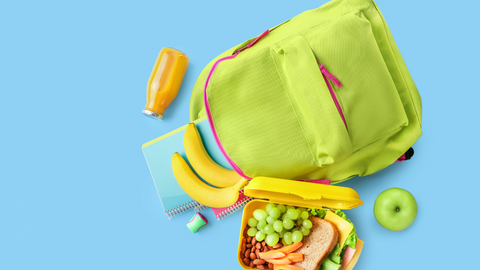
There are a growing number of parents leaning into the idea of “Food as Medicine” when it comes to the health, behavior and performance of their kids.
The Autoimmune Protocol Diet (AIP) is a specific way of eating aimed at reducing inflammation and promoting healing for individuals with autoimmune conditions. Recent studies have shown that this diet may also have positive effects on children's school performance and concentration by removing inflammatory foods from their diets. Let’s delve into the potential benefits of the AIP diet for kids and explore how it can lead to improved concentration, better behavior, and overall performance!
The AIP diet focuses on eliminating foods that are commonly associated with inflammation and immune system reactivity, such as grains, dairy, legumes, processed sugars, and certain vegetable oils. It encourages the consumption of nutrient-dense foods, including fruits, vegetables, quality proteins, and healthy fats. By doing so, the AIP diet aims to reduce inflammation in the body, which can have far-reaching effects on various aspects of health, including mental clarity and cognitive function.
Inflammation is a natural response of the immune system to protect the body from harmful invaders. However, chronic inflammation can lead to various health issues, including cognitive impairments. Research has shown that excessive inflammation in the brain can interfere with neurotransmitter functions and neural pathways, affecting memory, attention, and concentration.
Children's brains are constantly developing, and proper nutrition plays a crucial role in supporting their cognitive abilities. The consumption of processed and inflammatory foods may lead to blood sugar fluctuations and affect neurotransmitter balance, leading to mood swings, decreased attention span, and behavioral problems. By removing these trigger foods through the AIP diet, kids may experience improved mental clarity and emotional stability, directly impacting their performance in school.
Another significant aspect of the AIP diet's impact on school performance is its influence on behavior and emotional regulation. Some kids may exhibit hyperactivity, impulsivity, and attention difficulties due to inflammation-triggered imbalances in the brain. By adhering to the AIP diet, parents and teachers may observe positive changes in children's behavior, such as reduced restlessness, better impulse control, and enhanced emotional regulation.
The AIP diet emphasizes nutrient-dense foods that are rich in vitamins, minerals, and antioxidants. These essential nutrients are vital for optimal brain development and function. For instance, omega-3 fatty acids, found in fish and certain nuts, are essential for brain health and cognitive performance. Additionally, colorful fruits and vegetables provide phytonutrients that support memory and learning.
Some kids may be sensitive or allergic to certain foods, leading to subtle but impactful reactions within their bodies. These allergic responses can manifest as brain fog, irritability, and difficulty concentrating. The AIP diet's exclusion of common allergenic foods can help identify and alleviate these underlying issues, ultimately promoting better concentration and academic achievements.
The Autoimmune Protocol Diet is gaining recognition for its potential to improve not only physical health but also cognitive function in children. By removing inflammatory foods and focusing on nutrient-dense alternatives, the AIP diet may lead to enhanced concentration, better behavior, and improved academic performance for kids in school. Although further research is needed to establish concrete connections between the AIP diet and school performance, anecdotal evidence and preliminary studies suggest promising results.
Implementing the AIP diet into your family may feel very difficult and overwhelming. We totally get it!
Some tips we recommend:
1) Make small changes first. For example, choose a gluten-free pasta vs. a regular pasta as a first step (as opposed to removing all pasta). Then, try offering spaghetti squash and / or shredded hearts of palm (Palmini brand is a great and easy one!). Sometimes easing into it with kids makes things more doable.
2) Figure out your child’s favorite fruits, veggies and meats and always have them available. Depending on the child’s age and openness, try preparing them in different ways, making fruit and veggie art and involve them where possible. If you can make cooking and eating fun, kids are often more likely to try it…and enjoy it!
3) Keep it easy! Meats and veggies can be quite easy and quick to prepare. Lean into this and keep meals simple and flavorful. Sheet pans and batch cooking can make things even easier!
4) Discover treats & products on the market that are easy and delicious. We love brands like That’s It Fruit Bars, Siete Tortillas and Dang Coconut Chips because they are great for grab and go and kids tend to love them. We also, of course, recommend our baking mixes! Our Pancake & Waffle Mix can be batch cooked and frozen for busy school mornings. And our Oatmeal Schmoatmeal Cookie Mixes can be baked as “granola” bars for on the go too (we suggest adding raisins, carob chips and/or coconut chips)!
If you think your child might benefit from some simple shifts in their diet, it is advisable to consult with a healthcare professional or a registered dietitian to ensure a balanced and individualized approach to nutrition and overall well-being. With AIP, it is suggested that you try it for 30 days and see what you learn. You might be surprised how easy it is - and if you and your child are seeing results, it can be so worth it!



